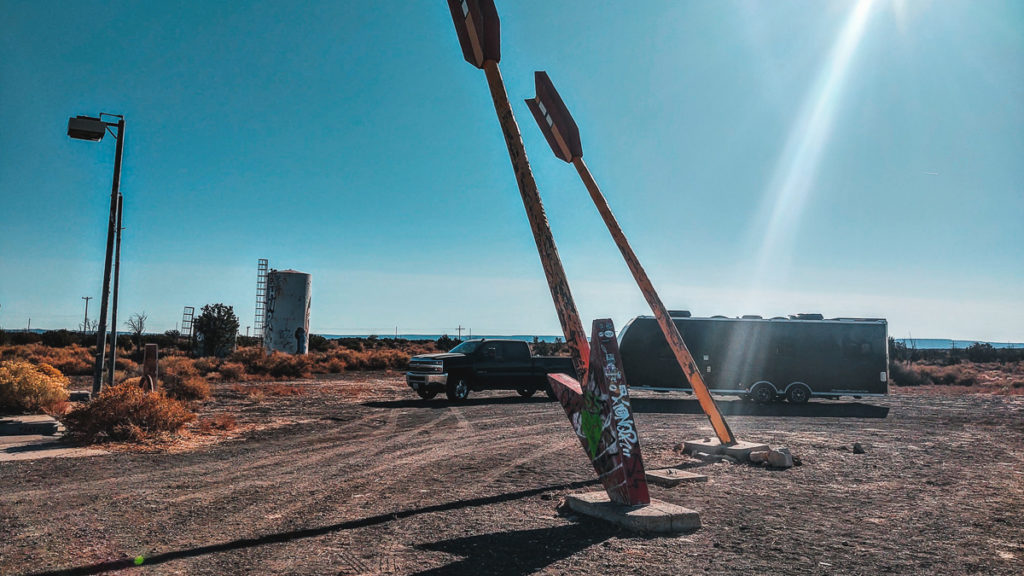No, you cannot legally dump gray water on the ground in Arizona, unless you hold a permit. The State has laws under the Environmental Code that prohibit anyone from “discharging” waste water and sewage on to the ground. These laws cover the entire State of Arizona with the exception of indian reservations and national parks.

Can I Dump Gray Water on the Ground in Arizona?
The State of Arizona requires that anyone discharging waste water or sewage onto the ground to first obtain an “Aquifer Protection Permit” from the Department of Environmental Quality. This is codified under Arizona’s Environmental Code, “49-241. Permit required to discharge” as follows…
A. Unless otherwise provided by this article, any person who discharges or who owns or operates a facility that discharges shall obtain an aquifer protection permit from the director.
§ 49-241. Permit required to discharge
The same set of Environment Codes includes definitions for the above permit requirement…
- “Aquifer” is defined under § 49-210 as, “…a geologic unit that contains sufficient saturated permeable material to yield usable quantities of water to a well or spring.“
- “Discharge” is defined under § 49-210 as, “...the direct or indirect addition of any pollutant to the waters of the state from a facility. For purposes of the aquifer protection permit program prescribed by article 3 of this chapter, discharge means the addition of a pollutant from a facility either directly to an aquifer or to the land surface or the vadose zone in such a manner that there is a reasonable probability that the pollutant will reach an aquifer.“
- “Facility” is defined under § 49-210 as, “…any land, building, installation, structure, equipment, device, conveyance, area, source, activity or practice from which there is, or with reasonable probability may be, a discharge.“
- “Pollutant” is defined under § 49-210 as, “…fluids, contaminants, toxic wastes, toxic pollutants, dredged spoil, solid waste, substances and chemicals, pesticides, herbicides, fertilizers and other agricultural chemicals, incinerator residue, sewage, garbage, sewage sludge, munitions, petroleum products, chemical wastes, biological materials, radioactive materials, heat, wrecked or discarded equipment, rock, sand, cellar dirt and mining, industrial, municipal and agricultural wastes or any other liquid, solid, gaseous or hazardous substances.“
In summary, based on the law requiring an “Aquifer Protection Permit”, and based on the state’s definitions of “aquifer”, “discharge”, “facility”, and “pollutant”, no individual can dump gray water or sewage on to the ground.
Dumping Waste Water and Sewage Into a Body of Water
In addition to the “Aquifer Protection Permit” requirement for dumping waste water and sewage onto the ground, the State of Arizona has a separate law concerning discharging the same into a body of water. This law is found under the State’s Criminal Code as follows…
A person commits criminal littering or polluting if the person without lawful authority does any of the following:
2. Discharges or permits to be discharged any sewage, oil products or other harmful substances into any waters or onto any shorelines within this state.
§ 13-1603
State Gray Water Law Does Not Apply to Dumping
The State of Arizona has a gray water law codified under its Environmental Code (see § 49-204. Gray water reuse). This law applies only to gray water that is being reused for residential gardening purposes, and applies only to gray water produced by a residence. It also is specific to just gray water sourced from a washing machine, shower, or bathtub, and does not apply to kitchen sinks, bathroom sinks, and toilets.
National Parks are Exempt from State Laws
Lands owned and operated by the National Park Service are exempted from state and local laws. But this does not mean you are allowed to dump gray water on the ground in national parks.
The National Park Service has regulations of its own that prohibit people from dumping waste water and sewage on the ground. This applies to all NPS properties in Arizona.
- Refer to NPS Regulation § 2.14 Sanitation and refuse for specifics.
- Refer to “Do State & Local Laws Apply to Federal Lands?“

